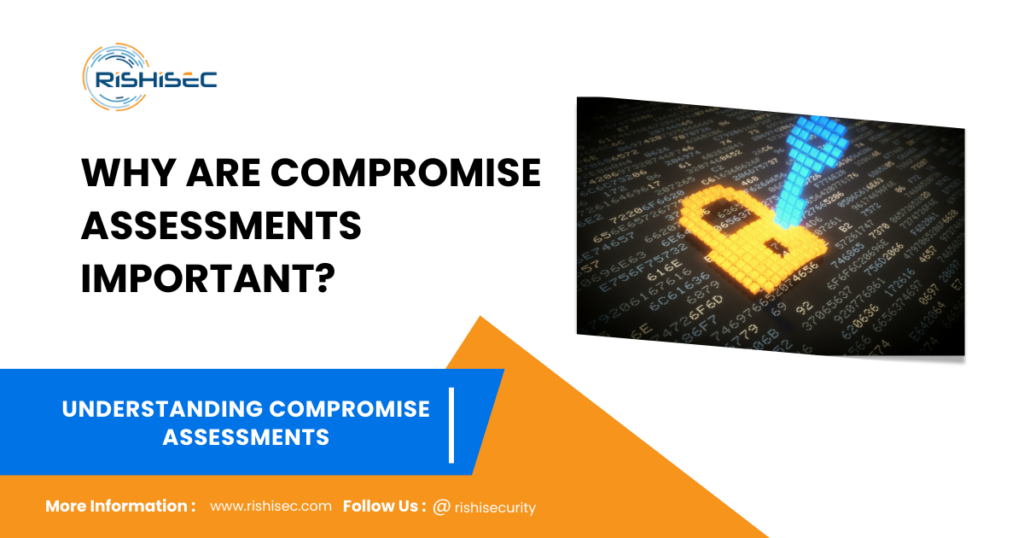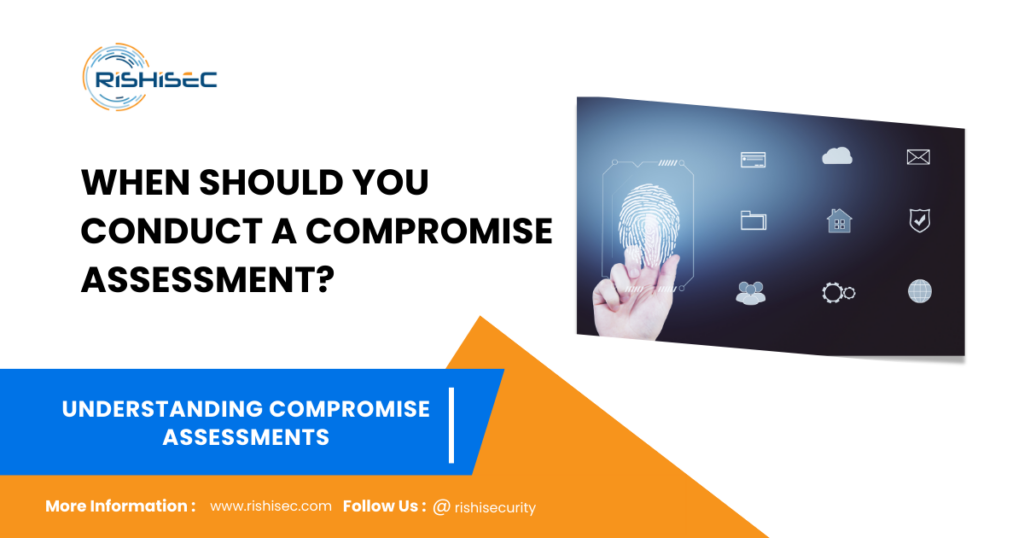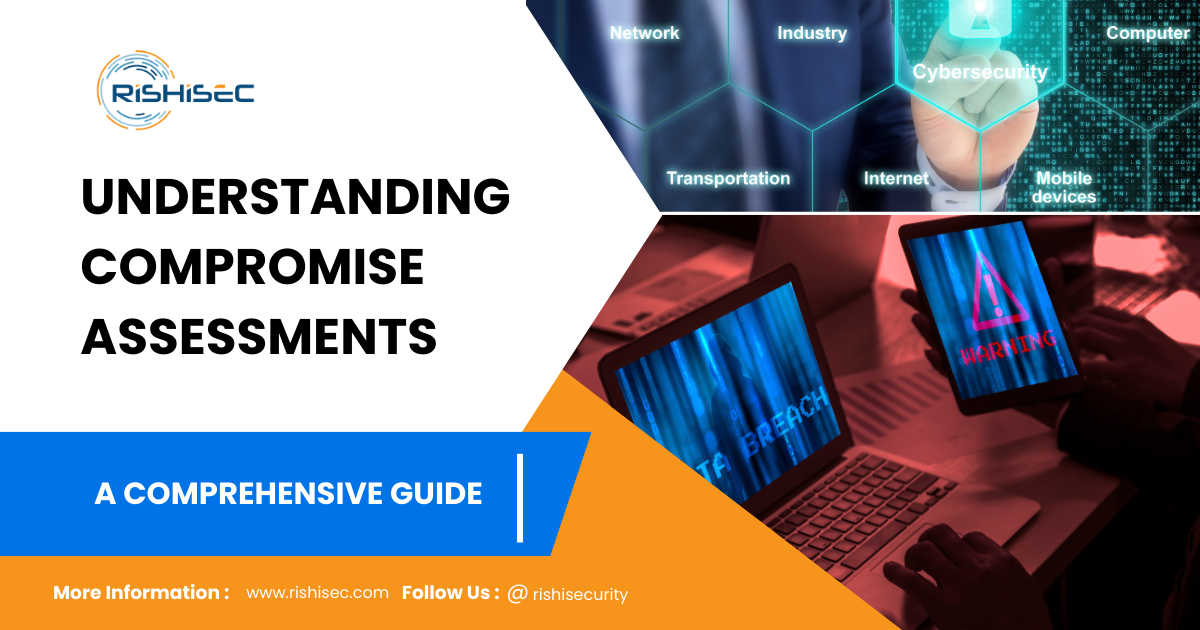Contents
- 1 Understanding Compromise Assessments
- 2 What is a Compromise Assessment?
- 3 Why Are Compromise Assessments Important?
- 4 Differences Between Compromise Assessments and Other Security Operations
- 5 How Does a Compromise Assessment Work?
- 6 Benefits of Conducting Compromise Assessments
- 7 When Should You Conduct a Compromise Assessment?
- 8 How to Choose a Compromise Assessment Provider
Understanding Compromise Assessments
Understanding Compromise Assessments is crucial in today’s dynamic cybersecurity landscape. As cyber threats grow more sophisticated, traditional security measures often fall short. Therefore, a Compromise Assessment (CA) takes a proactive approach by detecting whether malicious actors have compromised an organization and uncovering hidden threats that may have gone undetected for months or years. Moreover, identifying these risks early allows organizations to mitigate potential damage, strengthen defenses, and stay ahead of evolving attack vectors.
What is a Compromise Assessment?

A Compromise Assessment scans and analyzes an organization’s entire IT environment for signs of compromise. Specifically, it looks for malware, backdoors, and other indicators of unauthorized access. Unlike reactive measures like Incident Response (IR), which only handles active breaches, compromise assessments focus on identifying past or ongoing breaches that existing security controls may have missed. Furthermore, this service combines advanced threat hunting, forensic analysis, and system monitoring to uncover risks before they escalate.
Why Are Compromise Assessments Important?

Compromise assessments add a crucial second layer of defense for organizations. Even with security measures like firewalls, antivirus software, and Managed Detection and Response (MDR) services in place, companies still face the risk of sophisticated threats that slip through undetected. If a cyberattack succeeds, it can stay hidden for an extended period, causing widespread damage. In fact, a 2023 report from IBM Security revealed that businesses took an average of 287 days to identify and contain a breach—far too long for companies that cannot afford to lose valuable data or suffer reputational harm.
By conducting regular compromise assessments, organizations can ensure that potential threats are identified and mitigated early, helping maintain business continuity and safeguarding sensitive data.
Differences Between Compromise Assessments and Other Security Operations
While Compromise Assessments share some similarities with other cybersecurity services, they serve distinct functions:
- Compromise Assessment (CA) vs. Incident Response (IR): Incident Response is typically reactive, initiated after a known breach. CA, on the other hand, is proactive, aiming to discover breaches that may have gone unnoticed. CAs are often performed after an incident to confirm the environment is fully remediated.
- CA vs. Penetration Testing (Pentesting): While penetration testing is designed to uncover vulnerabilities before they are exploited, CA seeks to detect evidence of compromise or threat actors already present within the system.
- CA vs. MDR: Managed Detection and Response services offer real-time monitoring, while CAs are forensic investigations aimed at finding past or ongoing compromises.
How Does a Compromise Assessment Work?
A comprehensive compromise assessment typically follows these steps:
- Planning and Scoping: The cybersecurity team collaborates with the client to define the scope of the assessment, including which systems and networks will be analyzed.
- Data Collection: This involves gathering system logs, network traffic, and other relevant data. Tools such as endpoint detection agents and network sensors are deployed to monitor suspicious activity.
- Threat Hunting and Forensics: Cybersecurity experts analyze the collected data for signs of compromise. This can include searching for known malware signatures, anomalous behavior, or specific indicators of compromise (IoCs).
- Analysis and Reporting: Once the assessment is complete, a report is generated detailing any signs of compromise found, along with recommendations for remediation.
- Remediation: If any compromises are identified, the organization is provided with steps to mitigate the threats, which may involve removing malicious code, patching vulnerabilities, or improving security protocols.
Benefits of Conducting Compromise Assessments
- Uncover Hidden Threats: Advanced persistent threats (APTs) often hide within systems for months or years. A compromise assessment uncovers these lurking dangers
- Validate Security Posture: Even with extensive security measures in place, a compromise assessment provides a fresh perspective. It identifies overlooked weaknesses in an organization’s defenses.
- Mitigate Risk: Detecting threats early allows organizations to mitigate the risk of data breaches, financial loss, and reputational damage.
- Ensure Compliance: Many industries require regular security assessments to meet regulations like GDPR, HIPAA, and CMMC. Conducting a compromise assessment ensures organizations stay compliant.
When Should You Conduct a Compromise Assessment?

There are several scenarios where a compromise assessment is particularly beneficial:
- Post-Incident Verification: After a cyberattack, organizations may want to ensure that all traces of the breach have been removed, and no backdoors or other vulnerabilities remain.
- Routine Security Checkups: Conducting regular assessments can help organizations stay ahead of potential threats, especially in industries that handle sensitive data such as finance or healthcare.
- Before a Major Event: Mergers, acquisitions, or any other major business changes can make an organization an attractive target for cybercriminals. A compromise assessment before such events can ensure the security of critical systems.
How to Choose a Compromise Assessment Provider
Choosing the right provider for a compromise assessment is crucial to ensuring the effectiveness of the assessment. Here are some key factors to consider:
- Expertise and Experience: Look for a provider with a proven track record in conducting compromise assessments across various industries.
- Advanced Tools and Technology: The provider should use state-of-the-art tools for threat detection and forensic analysis.
- Comprehensive Reporting: Ensure the provider offers detailed reports with actionable recommendations for remediation.
- Custom Solutions: Every organization is unique. Choose a provider that tailors their services to your specific needs and challenges.
Final Thoughts
In today’s digital world, compromise assessments are essential for a strong cybersecurity strategy. Even advanced security measures can fail, leaving hidden threats undetected. If left unnoticed, these threats can compromise sensitive data and harm an organization’s reputation. However, compromise assessments identify risks early, ensuring data stays safe and secure.
Regular compromise assessments help businesses take proactive steps against cyber threats. They also protect assets and build trust with stakeholders. Strengthen your cybersecurity posture by making compromise assessments a regular part of your defense strategy.
CTA
Are you concerned about potential hidden threats within your IT environment? Our SentryCA Compromise Assessment service provides you with a thorough investigation of your infrastructure to uncover any signs of compromise. Schedule a free trial today and take the first step towards securing your digital assets. For more information on how SentryCA can help protect your organization, click here to learn more about our tailored solutions for senior IT leaders and security professionals.
Learn from here that How Compromise Assessments Enhance Your Cyber security Strategy


